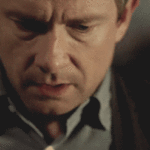For my Tiger, that wanted John’s heaving chest when he puts Sherlock on the stretcher.
I feel like I need to talk about this scene. I just keep looking at it and staring. Something big is going on here.
<snip>
threatens him. But Sherlock won’t shut up. He insists on talking over John and telling his story for him (just as he insists on talking for Mary later and telling her story for her). Even if he feels hurt by John marrying Mary, why not just take this opportunity to hang back and listen? See where this goes? Instead, he exerts extremely tight control over the entire scene. Like he has an outcome in mind and just wants to get there as quickly as possible. Why? Here are some possibilities, but I find none of them completely satisfying:
<snip>
I just get the sense that if we are to take this scene at face value (sans conspiracy theories), something must have happened in Sherlock’s mind to change his thinking from “I’m sad that John chose Mary instead of me” to “It’s right that John choose Mary over me.” I guess I’m starting to wonder if being shot by Mary had more of an impact than it seems on the surface. “It was surgery” = it corrected something that was wrong. Sherlock swaggers into Magnussen’s office hoping to impress John with his cleverness (as usual) and his conquest (Janine). Instead, he looks like a fool, getting all of his deductions wrong, including his very last one: that Mary wouldn’t shoot him. Mary incapacitates him, both mentally and physically (a kind of freudian castration?). I don’t know; I wonder if Sherlock feels after this that Mary is truly Sherlock 2.0—a newer and better version of himself. That he too has realized his own impotence in being able to provide for John what he needs; that Mary can provide it better.
I don’t know; it doesn’t make total sense of all the words and all the scenes (but I haven’t thought of anything that really does…so #betheplant).
Ok—I just need to reblog this to add a couple new thoughts along the lines of: Sherlock realized he can no longer perform and thinks John will be more impressed by Mary than by him.
- It occurred to me that throughout Series 3, we have the running theme of Sherlock’s perceived inferiority to Mycroft. He thought he was “stupid” compared to Mycroft, Mycroft sees him as a little child, Mycroft directs his deductions in his mind palace. When Sherlock deduces that Mary is intelligence, he quite possibly makes a quick mental parallel with Mycroft (MI-6). He now sees Mary not just as Sherlock 2.0, but as parallel to Mycroft—and therefore, to his mind, one notch better than him.
- Many people have commented on the brief moment of insight we get from Sherlock in HLV: that he is “a sociopath who solves crimes as an alternative to getting high…that’s me by the way.” Insightful, yes, to some extent. The whole story? No. Sherlock is seeing his life’s work here as essentially masturbatory, and seeing himself as childish. Sherlock sees himself one way through Mycroft’s judging eyes (childish, stupid, looking for his next ‘high’), but Mycroft actually sees him more favourably. To go back to ASiB, when Mycroft tells John that Sherlock chose to be a detective: “What can we deduce about his heart?” Mycroft actuallysees Sherlock’s choice of profession as an outgrowth of the care and love he has for others (which Mycroft himself disavows). (This also connects to Redbeard—Sherlock’s weakness is love.)
In any case, Sherlock does himself a great disservice by suggesting that his crime-solving is nothing but a masturbatory exercise, a mere substitute for a drug-induced high, and UGH once again calling himself a sociopath. He does two things here: he denies that he does what he does because some part of him cares deeply about people and justice, and he also denies (by invoking the drug high) John’s partnership with him in solving crimes: I do this for my fix. To continue my potency/impotence theme, I think that we move here from Sherlock’s idea that he was performing for John when he was solving crimes (go all the way back—“genius needs an audience”—he’s not into self-pleasure); to revising that idea—I was basically pleasuring myself and you were tagging along. Pushing John away again, but this time I think it’s because he no longer feels he can perform. Essentially saying, now you’ve found someone even better.
Part of the problem here is that Sherlock does actually take John on his escapades again on Christmas when he sets up the meeting at Appledore. Why does he do this if he’s basically already given up on being able to impress John, if he’s handed him over to another?
I think the answer is that Sherlock knew somewhere in the back of his mind that the meeting would not be particularly impressive. Look at canon—there’s not much deduction in CHAS; Holmes just decides to break into Milverton’s house and steal the contents of his safe. He resorts to basic and brute means to defeat a basic and brute opponent. In HLV, I think Sherlock sees John more as the client than his partner: come with me John, let’s go get those documents that CAM has which have the potential to ruin your life; then we’ll get CAM arrested, and then we’ll come back, and you’ll be safe. That was Sherlock’s plan all along. I don’t think he had any hope of impressing John and making him say “amazing” one last time.

Just another WordPress site


